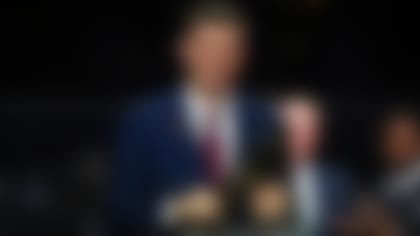WASHINGTON -- NFL labor talks broke down Friday, just hours before the collective bargaining agreement was set to expire, as the union rejected a proposal from the league, then decertified, and 10 players, including MVP quarterbacks Tom Brady and Peyton Manning, sued the owners in federal court.
In response, the NFL imposed a lockout of players, starting at midnight ET, after the CBA officially expired. The league confirmed the lockout in a statement Saturday morning.
The players went to court to request an injunction to block such a move by the league.
Despite two extensions to the collective bargaining agreement during 16 days of talks overseen by a federal mediator -- and previous months of stop-and-start bargaining -- the sides couldn't agree on a new labor deal.
"The parties have not achieved an overall agreement, nor have they been able to resolve the strongly held competing positions that separated them on core issues," mediator George Cohen said. "No useful purpose would be served by requesting the parties to continue the mediation process at this time."
Q&A: What's next for players, NFL?
Now that DeMaurice Smith's NFL Players Association has decertified, NFL Network legal analyst Gabe Feldman breaks down the labor possibilities for both sides. **More...**
» FAQ about union decertification
» Official statements from NFLPA, NFL
» Commissioner Goodell's message to fans
» League details its proposal to players
» Emotions run high on all sides
» Watch: Smith addresses media
» Watch: Pash, Quinn explain sides
» Watch: NFLN analysts discuss situation
» Watch: Indiana Dean of Law analyzes
By dissolving and announcing it no longer represents the players in collective bargaining, the union became a trade association and cleared the way for class-action lawsuits against the NFL, which opted out of the labor deal in 2008. The antitrust suit -- officially known as Brady et al vs. National Football League et al -- attacked the league's policies on the draft, salary cap and free-agent restrictions such as franchise-player tags.
Invoking the Sherman Act, an 1890 federal antitrust statute that limits monopolies and restrictions on commerce, the players are seeking triple the amount of damages they've incurred. That means the stakes could be in the hundreds of millions.
It could take a month for there to be a ruling on the union's injunction request, and antitrust judgments should take longer.
The CBA originally was due to expire last week, then was extended twice, in hopes that the sides could find common ground on the key issues: how to divide more than $9 billion in annual revenues, and how much financial information the league would be willing to reveal.
"I would dare any one of you to pull out any economic indicator that would suggest that the National Football League is falling on hard times," NFLPA executive director DeMaurice Smith said. "The last 14 days, the National Football League has said, 'Trust us.' But when it came time for verification, they told us it was none of our business."
It all sets the stage for a courtroom fight. The last time NFL games were lost to a work stoppage came when the players went on strike in 1987, leading to games with replacement players.
Even though the NFL is early in its offseason -- and the regular season is six months away -- this is hardly a complete down time. Free agency usually begins in March, and hundreds of potential free agents are now in limbo. Also this month, under a regular schedule, offseason workouts would start, and the owners meet to establish rules changes.
Plus, March and early April are when many sponsors and corporate partners renew their deals with the NFL, part of why the league says hundreds of millions of dollars in revenue now will be lost.
For now, the players will meet in Marco Island, Fla., beginning Wednesday, an annual convention that has taken place in Maui most years -- that's where Smith was elected successor to the late Gene Upshaw as executive director in 2009. Smith was charged with keeping the status quo as much as possible because the players liked the deal Upshaw and then-Commissioner Paul Tagliabue struck in 2006. They will plot strategy for the next few months, hopeful the request for a preliminary injunction filed Friday will stop the lockout.
"This obviously is a very disappointing day for all of us," New York Giants owner John Mara said. "I've been here for the better part of two weeks now, and essentially ... the union's position on the core economic issues has not changed one iota. One thing that became painfully apparent to me during this period was that their objective was to go the litigation route."
Labor negotiations timeline
A chronology of developments in NFL labor negotiations before Friday's union decertification:
2008
» NFL opts out of its collective bargaining agreement with the NFL Players Association, saying its costs are too high and it needs givebacks from the players. 2010 season will have no salary cap.
» Union leader Gene Upshaw dies in August.
2009
» After six months without an executive director, the players elect Washington attorney DeMaurice Smith.
2011
» On Jan. 18, union files collusion claim against owners regarding lack of movement of restricted free agents.
» On Feb. 5, the two sides meet for short negotiations one day before Super Bowl in Dallas.
» On Feb. 14, NFL files charge against union with National Labor Relations Board for not bargaining in good faith because of its plans to decertify.
» On Feb. 18, federal mediator George Cohen begins working with the two sides in Washington. Sessions follow for 16 days between then and Friday.
» On March 1, U.S. District Judge David Doty rules the NFL's contracts with the TV networks to collect $4 billion even if no games are played in 2011 is "lockout insurance."
» On March 3, with the CBA due to expire at midnight, the two sides agree to extend the pact for another 24 hours.
» On March 4, the two sides agree to extend the CBA for another week.
» On Friday, after rejecting the NFL owners' proposal, the NFLPA decertifies, giving up its right to represent the players. The NFL imposes a lockout of players, starting at midnight ET, after the CBA officially expired.
-- Associated Press
The NFLPA also decertified in 1989. Antitrust lawsuits by players led to a 1993 CBA that included free agency, and the union formed again that year.
The sides met from 10 a.m. until about 4 p.m. ET Friday, discussing a new proposal by the league's owners. When the possibility of another CBA deadline extension was raised, Smith said the union first wanted assurances it would receive 10 years of audited financial information from the league.
"I will tell you this: Any business where two partners don't trust each other, any business where one party says, 'You need to do X, Y and Z because I told you,' is a business that is not only not run well, it is a business that can never be as successful as it can be," Smith said.
At 4:45 p.m., Smith and the union's negotiators left. About 15 minutes later, the union decertified, saying it now becomes a professional trade association that supports the interests and rights of current and former players.
The players' union immediately shut down its websites -- NFLPA.org and NFLPlayers.com. A search for NFLPA.org yielded this message: "Error 404: Football Not Found. Please be patient as we work on resolving this. We are sorry for the inconvenience."
NFL general counsel Jeff Pash said the owners were on a conference call discussing the NFLPA's financial-records request when the union decided to decertify.
"No one is happy where we are now," Pash said. "I think we know where the commitment was. It was a commitment to litigate all along."
A league statement added: "The union left a very good deal on the table."
After Pash spoke, outside union lawyer Jim Quinn said: "I hate to say this, but he has not told the truth to our players or our fans. He has, in a word, lied to them about what happened today and what's happened over the last two weeks and the last two years."
Smith also strongly disagreed with Pash's assessment of the deal. Smith said the players were willing to give the league up to $1 billion in cash per year to fill revenue gaps in exchange for an equity position in an NFL team or any NFL property.
"And we were told by their lawyer a few months ago that his clients weren't, quote, interested," Smith said. "And when we made that same proposal today, we didn't even get a response."
The NFL said its offer included splitting the difference in the dispute over how much money the owners should be given off the top of the league's revenues. Under the expiring CBA, the owners immediately received about $1 billion before dividing the remainder of revenues with the players; the owners entered negotiations seeking to roughly double that by having an additional $1 billion up front.
But the owners eventually reduced that to about $650 million. Then, on Friday, they offered to drop that to approximately $325 million. Smith said the union offered during talks to give up $550 million over the first four years of a new agreement -- or an average of $137.5 million.
"We worked hard," said NFL Commissioner Roger Goodell, who was joined at mediation Thursday and Friday by nine of the 10 members of the owners' labor committee. "We didn't reach an agreement, obviously. As you know, the union walked away from the mediation process."
Also in the NFL's offer, according to the league:
» Maintaining the 16 regular-season games and four preseason games for at least two years, with any switch to 18 games down the road being negotiable.
» Instituting a rookie wage scale through which money saved would be paid to veterans and retired players.
» Creating new year-round health and safety rules.
» Establishing a fund for retired players, with $82 million contributed by the owners over the next two years.
» Financial disclosure of audited league and club profitability information that isn't even shared with the teams. That was proposed by the NFL this week, and rejected by the union, which began insisting in May 2009 for a complete look at the books of all 32 clubs.
Pash outlined each element of the owners' last offer and ended nearly each with the phrase: "Evidently not good enough."
When Goodell, Pash, Mara and owners Jerry Jones of the Dallas Cowboys and Jerry Richardson of the Carolina Panthers emerged from Cohen's office shortly after 5 p.m., they sounded hopeful that negotiations would soon resume.
"We're discouraged, we're frustrated, we're disappointed, but we are not giving up," Pash said. "We know that this will be resolved in the negotiation process. We will be prepared to come back here any time the union is ready to come back here."
Said Goodell: "We do believe that mediation is the fairest and fastest way to reach an agreement that works for the players and for the clubs. And we believe that, ultimately, this is going to be negotiated at the negotiating table. They've decided to pursue another strategy, and that is their choice. But we will be prepared to negotiate an agreement and get something done that is fair to the players and fair to the clubs."
NFL Network insiders Albert Breer, Jason La Canfora and Michael Lombardi, as well as The Associated Press contributed to this report.



